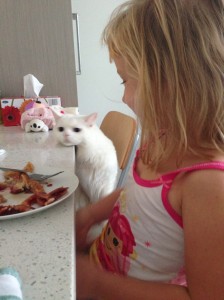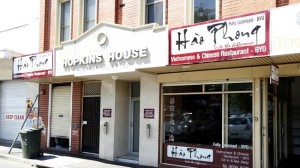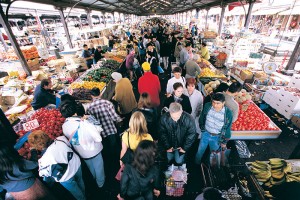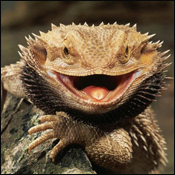In reality, not so much.
Tag Archives: Melbourne
‘Would you take tea with a pussy?’
I would like to write that headline, but I didn’t, that’s just how the remaining newspapers roll in Australia.
 There’s no denying Australians love their pets. So much so that many businesses, such as cafes and hotels, advertise themselves as “pet-friendly”. But a new cafe is offering a solution for people who love animals but aren’t in a position to own one.
There’s no denying Australians love their pets. So much so that many businesses, such as cafes and hotels, advertise themselves as “pet-friendly”. But a new cafe is offering a solution for people who love animals but aren’t in a position to own one.
Australia’s first cat cafe will open in Melbourne this July. The premises will comprise a cafe and an area that houses a number of cats that people pay to visit and interact with. The idea came from husband and wife team, Anita and Myles Loughran, after they visited a cat cafe in Tokyo on their honeymoon. After returning to Australia and becoming dissatisfied with their jobs, they decided to see if starting their own cat cafe was feasible.
The cafe area is on the ground floor while the cats are located on the first floor. “There are four rooms for people to interact with the cats and a fifth room which is just for the cats and where they stay overnight,” Loughran says.
Loughran says the biggest challenge in getting the cafe off the ground was convincing Melbourne City Council that she was serious. “They didn’t think it was possible because of health and safety regulations, but after three months they came on board with the idea.”
 A keen supporter of the idea is the animal management department of the Melbourne City Council. “They have an issue with international students who come here to study but miss their pets so much they go out and buy one for the time they’re here,” Loughran says. “But when they go back home they just dump them. It is hoped the cafe will help alleviate this problem as it will give students a place to come and interact with animals,
A keen supporter of the idea is the animal management department of the Melbourne City Council. “They have an issue with international students who come here to study but miss their pets so much they go out and buy one for the time they’re here,” Loughran says. “But when they go back home they just dump them. It is hoped the cafe will help alleviate this problem as it will give students a place to come and interact with animals,
Why wasn’t a public warning issued? Pregnant women among 21 people sick after salmonella outbreak at Vietnamese restaurant in Australia
Two heavily pregnant women were among at least 21 people believed to have fallen ill after a salmonella outbreak at a popular Vietnamese restaurant in Melbourne’s inner west.
Authorities confirmed the outbreak at Hao Phong on Hopkins St in Footscray has forced at least three people to admit themselves to hospital.
Department of Health spokesman Graeme Walker said a further 18 people were  suspected to have been affected by the outbreak, which occurred in late December.
suspected to have been affected by the outbreak, which occurred in late December.
Mr Walker said one of the confirmed victims spent “several hours” in hospital under observation before being released.
Two others presented at hospital where they were assessed and released.
Pregnant Anny Egan, 33, told the Herald Sun she and her daughter Summer, 2, became violently ill after eating at the restaurant during the contamination period between December 27 to 31.
Her husband Craig, 33, also got sick after the family visited Hao Phong – one of their favourite restaurants.
The Yarraville woman, who is due to give birth tomorrow, said she was “terrified” of going into labour while she was sick.
“It was hell,” she said.
“I thought it was gastro. I thought, is my husband gonna be able to hold the baby? Is my daughter going to be able to meet the baby?”
Mark Maltar said he, his partner who is eight months pregnant, and his in-laws became violently ill after ordering takeaway from Hao Phong during the contamination period between December 27 to 31.
His partner has been to hospital twice in the past week for tests to make sure their baby wasn’t harmed.
“We were pretty concerned about the baby,” Mr Maltar said.
“The advice we’ve been given is that it’s highly unlikely the baby has been contaminated, but we have to wait and see.”
Workers inside the restaurant this morning would not speak to the Herald Sun.
Signs taped to the restaurant’s front door told customers: “We are temporary closed today due to the exhausted fan and store are out of order.
“Sorry for any inconvenience.”
Maggot infestation at Melbourne’s Sushi Sushi
Sushi Sushi at Maribyrnong’s Highpoint shopping centre apparently served a Melbourne student a crispy chicken roll infested with maggots, the latest of many food hygiene infringements from the Japanese food franchise.
“I looked and saw two things wiggling around,” recounted Chloe McSaveney. “I spat out what I had in my mouth.”
She claims that when she confronted store workers they simply threw the roll in the bin and  offered a refund for her meal.
offered a refund for her meal.
Highpoint centre management staff retrieved the offending roll and presented it to local health inspectors for testing. Lab results confirmed the presence of fly larvae.
While Maribyrnong Council environmental health officer Jonathan Brett admitted that “the presence of a maggot is unlikely to cause physical harm,” McSaveney is still reeling from the encounter.
“The mental side of things is still affecting me now,” she told The Age. “I’m having trouble eating – I’m only eating about half of what I normally eat, and I’m struggling to be confident my food isn’t ridden with maggots.”
Sushi Sushi’s general manager Paul Grixti originally claimed that “in 15 years of trading … this was the first food safety incident they have ever had.” However, public records tell a different story.
In March of this year, the owner of Sushi Sushi’s Glenferrie store was fined $18,000 for nine food hygiene offences. The charges included a failure to take all practical measures to keep pests from the eatery’s premises.
Last year the Sushi Sushi outlet at Doncaster’s Stockland The Pines Shopping Centre was also charged for “a couple of procedures that weren’t followed,” according to a backtracking Grixti.
The apologetic general manager insisted that he did not mean that Sushi Sushi had never breached food safety rules, just that it was the first case where fly larvae was found in the franchise’s food.
$3500 fine; Melbourne market sold food contaminated with rat feces, court hears
The Queen Victoria Market in Melbourne is a sprawling enterprise that I always visit when in town; but I have no delusions about food safety.
The Melbourne Magistrates’ Court has, according to the Herald Sun, heard six inspections over a six-month period revealed stallholder Robert Dinardo, 47, had food on display  containing rodent droppings and packaging that had been gnawed at and shredded by rats.
containing rodent droppings and packaging that had been gnawed at and shredded by rats.
An environmental health officer also found incorrectly labeled items and food for sale containing dirt, insects and feathers.
Dinardo pleaded guilty to 13 charges, including failing to comply with relevant legislation and selling food unsuitable for human consumption.
Dinardo was convicted and fined $3,500 and ordered to pay costs of $2,100.
Melbourne woman critical after eating mushrooms
A Melbourne woman is critically ill after eating a toxic death cap mushroom.
Six months after a similar outbreak in a Canberra restaurant killed two and sickened one, Australian health authorities are again warning people not to pick their own mushrooms as recent weather (1).jpeg) conditions have created the ideal environment for the poisonous fungi.
conditions have created the ideal environment for the poisonous fungi.
Austin Hospital emergency department director Dr Fergus Kerr said death cap mushroom poisoning is particularly hard to detect as the more severe symptoms may not appear until a day or two after ingestion.
He said poisoning by death cap mushrooms had a mortality rate of about 50 per cent and urged people to only eat commercially farmed mushrooms.
Loophole, money concerns contributed to peanut death of student at fancy Melbourne school
A prestigious Melbourne private school has been slammed by a coroner who found it directly responsible for the death of a student who was fed beef satay despite having a known peanut allergy.
The Sydney Morning Herald cited coroner Audrey Jamieson as saying Scotch College was ignorant of recently released guidelines on anaphylaxis and showed a lack of respect to people with dietary preferences or requirements when it gave 13-year-old Nathan Francis the meal that claimed his life.
Two other cadets with a peanut allergy had the same meal.
The boy’s mother had informed the school of his allergy before Nathan attended the annual college army cadet camp at the Wombat State Forest in March 2007.
The inquest heard Scotch College bought ration packs from the Australian Defence Force in a bid to save $39,000.
But because the packs are not sold to the public, and since people with allergies are not permitted to join the army, they were not subject to food labeling legislation.
"This lackadaisical approach to the distribution of the ration packs possibly represents a certain mindset about the ‘type’ of boy/man that should be in the army/army cadets, but at a minimum represents a lack of respect or prejudice towards those with dietary preferences and/or requirements," Ms Jamieson said.
"The systematic failures may have commenced at the level of the army, but whatever lay behind and drove the process of distribution, it lacked rigour at the Scotch College level and operated in a way without regard to the consequences.
"Scotch College failed to exercise reasonable care and attention to the medical and food allergy information provided and known to them at the time preparations were being made for the camp."
In a finding delivered on Friday, the coroner said Nathan’s death was directly related to the college’s failure to take reasonable steps to ensure the health and safety of the boys attending the cadet camp.
She said his death could have been prevented if the college had exercised reasonable care and attention.
Ms Jamieson said college staff at the camp had an unacceptable level of complacency towards student safety.
The inquest heard there was a 10-minute delay in Nathan receiving his EpiPen (allergy treatment injector) because a staff member felt "uncomfortable" administering it.
Outside court, Nathan’s father Brian thanked the coroner for her strong findings.
"To say Nathan’s death has devastated our lives is too simplistic and understates the horror that has torn through our family," he said.
"Scotch college could have so easily prevented Nathan’s death.
The family reached a confidential settlement with the school and the ADF following a Federal Court ruling that the army pay a $210,100 penalty over Nathan’s death.
Illegal slaughterhouse — goats dogs frogs dragons — found in Melbourne
Police raided a Rockbank, Australia property this week with representatives from the RSPCA, Melton Shire Council, the Department of Sustainability and Environment (DSE) and the regulator responsible for meat safety, PrimeSafe.
"The other agencies attended the residential address in relation to information about possible wildlife and animal cruelty offences, as well as the alleged production and selling of meat," a 
.jpg) police spokeswoman said.
police spokeswoman said.
An RSPCA spokesman said 22 dogs of varying breeds were found and about 100 goats, one of which had to be euthanased on humane grounds.
PrimeSafe chief executive Brian Casey said two goat carcasses were found and about 20 kilograms of sheep or goat meat was discovered in a freezer.
There was no evidence dogs had been slaughtered, he said.
In Victoria it is illegal to slaughter non-consumable animals such as dogs, horses, cats and donkeys.
"You can slaughter consumable animals [such as goats] but they must be slaughtered at a licensed abattoir," Mr Casey told AAP.
There was an exemption in place to enable farmers to slaughter edible animals on their properties for their own consumption, but the Rockbank property was not a farm, he said.
More than 45 animals were seized by DSE including 30 frogs, four central bearded dragons, a children’s python and a crucifix toad, which were being kept illegally.
"A wildlife licence is required by anyone keeping and trading protected wildlife in Victoria."
Pins in packets; chip contamination scare
A police spokeswoman confirmed officers were working with the Department of Health and the manufacturer to determine whether the contamination was deliberate.
A caller to 3AW’s rumor file today claimed that pins, needles and paper clips were found inside  three packets of chips in the supermarket.
three packets of chips in the supermarket.
The police spokeswoman could not confirm the location of the supermarket or any further details about the investigation, however said the "safety of consumers is paramount."
No public health warning has been issued.
Melbourne’s dirtiest restaurants downtown
Melbourne’s CBD (central business district) has the most restaurants in the state breaching food safety laws, according to a register of convictions that names and shames Victorian eateries.
Thirty-six individuals and businesses representing 24 restaurants have been named on the register since the Brumby government set it up on July 1 last year.
Eleven of the convictions on the register are against restaurants within Melbourne’s CBD.
Asian restaurants and grocery stores appear to be the worst offenders, making up almost half of all convictions.? But the list also contain bakeries, a cafe attached to a car wash and a venue operating at the popular Queen Victoria Market.
The offences include:?- failing to remove pests living in the premises;?- smoking near food preparation areas;?- not storing potentially hazardous food correctly;?- not providing soap  and warm water for food handlers;?- having no means of drying hands to reduce the risk of contamination; and?- having kitchens with an accumulation of garbage, food waste, dirt or grease.
and warm water for food handlers;?- having no means of drying hands to reduce the risk of contamination; and?- having kitchens with an accumulation of garbage, food waste, dirt or grease.
The worst offenders include Noodle Kingdom, whose owners were ordered to fork out $70,000 for various breaches.

